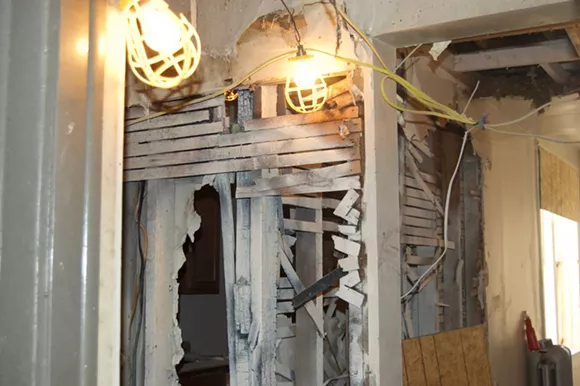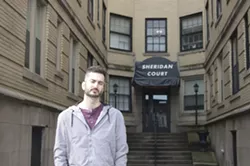
Violet Ikonomova
Burned-out walls in one of three Sheridan Court apartment units damaged by fire on March 15. The building had failed its last fire inspection and did not have a certificate of compliance.
Daniel Lecours had just sat down for dinner in his Midtown apartment the evening of March 15 when he heard the screams outside his door.
“Fire! Fire!” his neighbors at the Sheridan Court Apartments were shouting.
The 27-year-old swung open his door to find the building’s fourth-floor hallway filling with smoke and a line of flames spreading along the ceiling of the unit across the way. He sprung into action.
Lecours ran to his kitchen in search of the fire extinguisher that came with his apartment, giving the yellowing tag hanging from the top a suspicious glance before returning to help his panicked neighbor. He aimed the nozzle at the flames and squeezed, unloading the extinguisher’s full contents.
It made no difference; the flames would not relent. Lecours ran back to his apartment, grabbed his cat and laptop, and fled.
He would return a day later to find everything he’d left behind destroyed. Two other units had also burned, displacing the people who lived in them and costing them their stuff.
Lecours was living in a hotel last week when he spoke on his experience.
“It’s been a disaster,” the Wayne State University student said. “It’s something I do not want to deal with at any time, especially in the middle of a semester during my first year of medical school.”
Records obtained by Metro Times show that the 91-unit building was cited by the Detroit Fire Marshal in August for aging fire extinguishers, faulty fire doors, and unlit exit signs. A re-inspection report showed those and other issues were not resolved by November and a walk-through of the building a week after the fire revealed problems persist: Metro Times found fire doors that wouldn’t fully close just steps from where the blaze occurred, paper exit signs, and fire extinguishers aged up to 20 years. Detroit fire code requires extinguishers be maintained yearly.
On March 27, a supervisor with Sheridan Court Apartments owner P&B investments claimed all fire code issues had been resolved. A tenant later that day said that was not the case.
Blight tickets issued by the city’s Buildings, Safety Engineering, and Environmental Department a week after the fire point to further issues at the nearly hundred-year-old Sheridan. P&B Investments was fined thousands of dollars for failing comply with emergency maintenance orders, failing to register the building as a rental property, and lacking a certificate of compliance. Building supervisor Bob Johnson acknowledged the building did not have a certificate of compliance and said repairs are in the works to get the building up to code. Certificates of compliance are granted after a landlord registers the property and passes the requisite fire and building inspections. Technically, people in the city of Detroit should not be living or operating in commercial structures without one.
Compliance issues have been making headlines as of late. In February, BSEED moved to evict dozens of artists and small business owners at the Russell Industrial Center due to hazardous conditions at the complex along I-75. Records obtained through the Freedom of Information Act show the building has operated without a certificate of compliance since 2015. The same FOIA request found that several of Russell owner Dennis Kefallinos’ loft-style properties, where people actually live, also operate without certificates of compliance.
More recently, an apartment building on Detroit’s far east side made headlines because it wasn’t registered with the city as a rental property and lacked a certificate of compliance. The city cited the building owner for the issues in 2014 and never followed up. On March 8, a wind-swept arson fire at the Whittier Avenue building killed five people.
In response to the Whittier blaze, BSEED issued a statement acknowledging that inspectors haven’t been able to conduct “every legally required inspection.” Detroit city code says that rental properties required to have a certificate of registration are to be inspected “as closely as possible to once a year.”
“We always strive to inspect buildings annually, but too often have not been able to do achieve this,” the statement read. The challenge, the department said, is that it lacks the manpower to annually examine the more than 20,000 commercial structures throughout Detroit. Most of the inspectors that have left or retired over the last decade or so have not been replaced.
“It’s like a perfect storm,” says Anthony McClerklin, a Detroit area attorney who specializes in landlord-tenant law. “When you have a lot of people who need shelter and not a lot of people who can oversee this great demand then of course you’re gonna have landlords fall through the cracks. [The landlords] are betting on this, and they’re collecting a lot of money from people who should not be in these apartments.”
When landlords don’t follow the law, the city has some discretion in determining how to penalize them. BSEED director David Bell says the department starts by issuing the building owner a violation notice and, depending on the severity of the problems, giving them a timeframe in which to make repairs. If the property owners don’t bring their building into compliance, the department begins issuing blight tickets like those delivered to the Sheridan. In some cases, the conditions are deemed so hazardous that they warrant evictions. Bell says that last winter, a couple of apartment buildings without heat and running water had to be vacated. He did acknowledge it is within the city’s power to evict people at any building without a certificate of compliance.
Lecours believes BSEED should have taken that step at the Sheridan.
“It should have been shut down,” he says of his former apartment complex. “There should be no way anyone is allowed to even live there when it fails fire inspections and building inspections. I mean we got lucky, if that fire had started at three in the morning, I don’t know what would have happened. It could have been way worse.”
"If we create an atmosphere where [landlords] feel they’re not welcome ... then they’re not gonna tell their investor friends to come on and invest in Detroit."
tweet this
Bell says the lack of certificates of compliance at buildings throughout Detroit is the biggest issue facing renters in the city. And he says addressing the “rental issue” is the department’s top priority as renewed interest and investment in Detroit drive up demand for living spaces and prompt developers to convert old industrial buildings into lofts and apartments. Over the past roughly year and a half, the department says it has brought the number of registered rental properties in the city up from about 2,000 to 5,000. BSEED also recently hired seven new inspectors and plans to soon add eight more. And it has implemented a system that automatically prompts inspectors to review properties with outstanding violations so they are not forgotten.
However, that doesn’t mean a crackdown that could lead to mass evictions is afoot, Bell says. Instead, the department has created a special office to help bring the city’s landlords into compliance.
“We’re here to work with the landlords to help bring the city up,” Bell says. “If we create an atmosphere where they feel they’re not welcome and they can’t make money in the city while doing the right thing then they’re not gonna tell their investor friends to come on and invest in Detroit. I have to balance code compliance with making sure that they know we are here to welcome them.”
But McClerkin says Detroit risks facing legal action if it doesn’t keep up on its oversight duties.
“If the city has put itself in that position so be it, then they need to be sued,” he says. “It’s just unfortunate it’s so hard for these tenants. They don’t have any money, and for that reason it’s hard to find an attorney who would go through the expensive litigation to go against the city.”
McClerkin concedes that it’s easier to sue a non-compliant landlord than a city, and he has yet to see a case in which Detroit’s buildings department has been sued. He says the burden of proof would rest heavily on the tenant and that they’d have to make the case that the city’s negligence caused a fire or some other kind of catastrophic event; an intentionally set fire would likely not pass that test.
At the Sheridan, officials say the cause of the fire was likely an electrical issue and Lecours, for now, is only mulling taking legal action against the building’s owner.
Meanwhile, he's decided to shell out $300 more a month in rent to move to what he believes is a better-managed Midtown apartment building. Just down the street, his former neighbors continue paying rent to the non-compliant landlord the city has allowed to stay in business.


